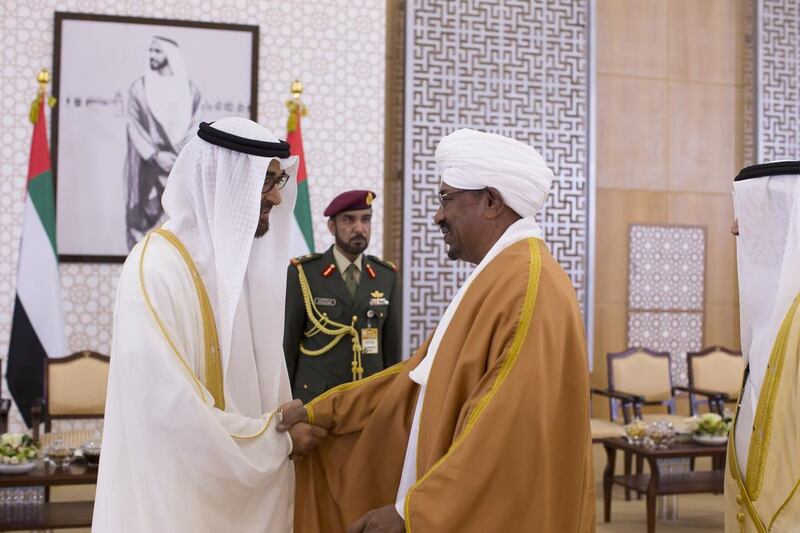ABU DHABI // Sudan faces a serious threat from both ISIL and Boko Haram and expects the danger posed by ISIL to cross its borders, its president said on Sunday.
“Daesh is a threat for everybody,” Omar Al Bashir said on a visit to Abu Dhabi. “Although we are doing our best to maintain the security of our country, some elements will cross the border of Sudan to go to Libya and Syria and other places to fight alongside them. And these people will come back to Sudan.
“As you know, Sudan is part of Daesh’s master scheme, as they plan to take over Habasha,” Mr Al Bashir said. A widely circulated map purports to show the extent of ISIL’s ambitions, with Sudan, Ethiopia, Somalia and Eritrea forming one “emirate” called Habasha, the historic Arabic name for Ethiopia.
“We also have a threat coming from the west, with Boko Haram. Because within the composition of the Sudanese people, we have a lot of immigrants from West Africa – from Nigeria, Chad, Niger, and other countries – who mixed with the Sudanese people.”
Mr Al Bashir also reiterated an argument that he has made in recent interviews: that the CIA and Mossad, Israel’s intelligence agency, were behind the rise of ISIL.
“It is not possible that such an organisation could appear out of the blue and gain this kind of power without being supported by external powers,” he said.
He questioned how the American intelligence agency was able to operate in many countries and yet appeared to be blind to the workings of ISIL.
Nor was the Sudanese president swayed by the suggestion that the US has entered into a coalition – along with the UAE – against the militant group.
“In principle, we find that the Americans have a hand in every problem that occurs in this area. Because they are Israel’s allies in this region. And the power of Israel hinges on the weakness of the Arabs.”
Mr Al Bashir also pointed the finger at those companies that purchase oil from the refineries under the control of ISIL.
“The information that we have – but we are not sure of it – is that they [ISIL] produce 150,000 barrels of oil per day and sell it on the black market. And everybody knows who these companies which buy this fuel from them are, but they cannot be stopped. And this is how they get their funding.”
Mr Al Bashir also discussed the role of ideologies in gaining radicals. “Daesh is an extension of Al Qaeda, because they share the same ideology.
“The reason Daesh spread so quickly is that already existing supporters of Al Qaeda lent their support to these Al Qaeda affiliates like Daesh. The sympathy was already there.”
But he pointed to the experience and success of Sudan in deradicalising some returning jihadis.
“These young people, we believe that they are sincere. But they fell prey to groups that fed them the wrong ideas. This is an ideology than can only be fought with a counter ideology.
“That’s why we brought in young clerical scholars to speak to the minds of these young people, and have a dialogue with them. Ideas can only be fought with ideas.”
The experience of deradicalisation – taking returning jihadis or those influenced by militant ideologies – and dealing with the root causes of their belief is patchy. Saudi Arabia has had some success with deradicalisation and many western countries are looking into similar programmes for their citizens returning from Syria and Iraq.
“We are dealing with groups of young people who are armed with an ideology that allows them to declare people in society as apostates,” said Mr Al Bashir, meaning takfirism, a belief that it is possible to “excommunicate” some Muslims for their behaviour or beliefs and therefore sentence them to death for “apostasy”.
“We were able to prepare convincing counter-arguments to refute such erroneous ideas,” said the president. “And our experience is successful.
“A lot of these people were swayed back to the right path and many of them have gone out to convince other youths to forsake the wrong path and join them.”
falyafai@thenational.ae







